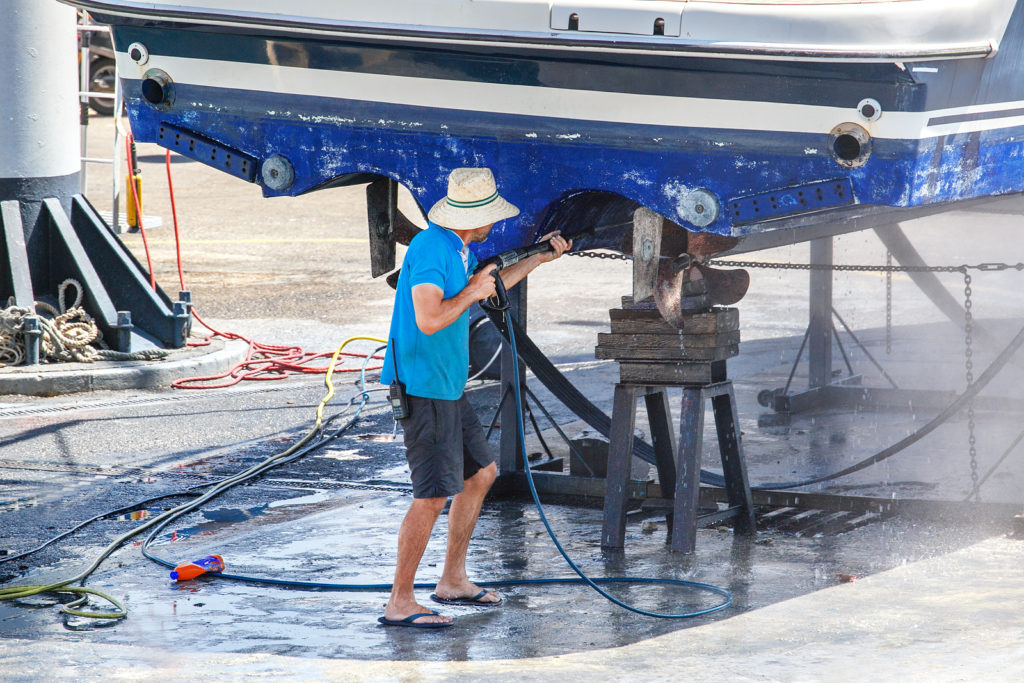Clean Your Boat
When you first pulled your boat out of the garage, did you notice any corrosion on the outside? When you’re out on your boat a lot, especially if you boat in saltwater, you should rinse your boat with fresh water after every use.
If you didn’t do this consistently during boating season, or if you didn’t fully clean your boat before putting it up for the winter, you will need to give your boat a deep clean before taking it out to remove any buildup, rust, or anything else that may hinder your boating experience. To do this, use a long-handled bristle brush and environmentally safe soap for marine surfaces to give your boat the care it needs while also protecting the wildlife in the waters you boat in.
Inspect the Interior and Exterior of Your Boat
Do you have any holes in your boat? Is your boat cracked anywhere? Take the time to complete a thorough inspection of your boat’s interior and exterior.
Checking for damage and excessive wear and tear before you get out on the water allows you to fix the issue before it becomes dangerous to you, your family and your friends.
Test All of Your Boat’s Operating Systems
If you had any issues last summer, like oil leaking from your boat, or issues with your boat’s engine not starting properly, giving these–and all of your systems–a thorough check will give you the peace of mind you need to enjoy your summer. A few specific things to take note of before taking your boat out include:
- Checking your oil, power steering and coolant levels and changing them if necessary
- Checking for and patching any leaking hoses–this protects you and the wildlife in your boating waters
- Replacing any worn or damaged equipment that would render your boat unsafe
- Test your battery, depth finder, radio, compass, GPS and all other navigation equipment so you are prepared in the event you get lost
Build Your Emergency Toolkit
If you’re ever stuck in the middle of the water on your boat, you will want and need an emergency toolkit. Preparing for an emergency makes you able to handle it if and when it happens.
You might not be sure what you need in your boat’s emergency toolkit. Think through what you would need for a variety of boating mishaps:
- A first-aid kit–make sure you have bandages, antiseptic, gauze, cold packs and whatever else you may need to nurse a wound on the water
- A store of spare light bulbs, batteries, fuel, filters and more–you never want the worst to happen, but being prepared for it will make you feel much more at ease.
- Do you know what you need if you’re stopped by the Coast Guard? You need copies of your boat’s documentation, radio license and all other required paperwork associated with your boat and boating equipment.
Focus on Safety
One of the most important things you can do for yourself, your family and anyone you take out on your boat is to keep a few boating safety tips in mind.
- Ensure your boat is free from fire hazards and all extinguishers are fully charged and in their proper place.
- Make sure you have enough life jackets and that they are all in good condition.
- Have ample Visual Distress Signals on hand, including flares, a flashlight and mirrors, as well as a sound-producing device like an air horn—make sure it is capable of producing a four-second blast you can hear from at least a half-mile away.
This is not an exhaustive list of everything you need to do to make sure your boat is ready for the water, but a good place to start. Stay safe, and enjoy your boat this summer!


